The best indoor TV antennas are a must-have if you’ve cut the cord for good when it comes to cable TV. Buying an indoor TV antenna for your home is a cheap and easy way to get access to many free over-the-air channels in HD for no monthly fee.
The best TV antennas offer a portal into the world of sports, sitcoms, news, and more that are all on offer across America’s most popular TV networks – and all for free. This fact is largely obscured by cable companies because they’re keen to sign you up for an expensive cable plan.
However, what you can get with a TV antenna isn’t without its limits. Over-the-air broadcasts offer fewer choices than any cable package out there. On the plus side, they're totally free and still usually carry many of the biggest sports events (the NFL on Sunday, the NBA Finals and the Stanley Cup), as well as a solid selection of sitcoms, dramas and comedy shows from NBC, ABC, CBS and more.
With plenty of indoor TV antennas to choose from, it can be confusing to know where to start. So which is the best indoor antenna for your smart TV? That's exactly what we wanted to find out, so we’ve tested a whole range of them from different tech brands and put them to work. What you'll find below is our round-up of the best indoor TV antennas on the market in 2021. Keep checking back as we’ll be adding new antennas to this list.
Just be careful you don't fall for misleading product pages elsewhere. Some outlets promise outrageous features like a 120-mile range (which isn't possible, given the curvature of the earth). You can get 4K resolution though a regular antenna, though, with the next set of ATSC standards called NextGen TV.
Best indoor TV antennas 2021
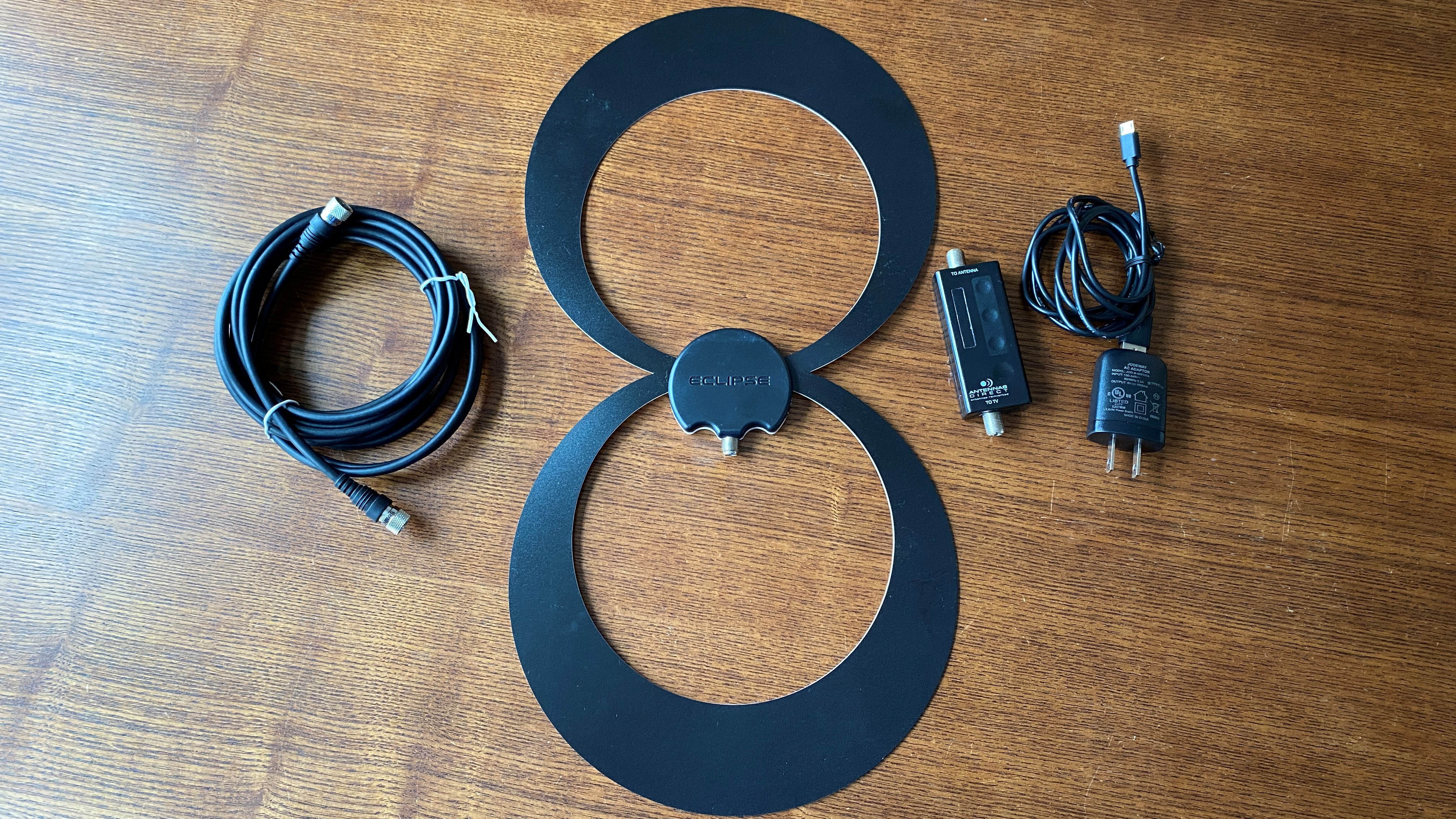
The ClearStream Eclipse 2 is similar to Amazon's thin, plastic antenna at its core, but this very distinctive figure-eight design is one of a kind. Whatever engineering Antennas Direct did to pin down this kind of design clearly worked, however, as this amplified long-range antenna does an excellent job of picking up channels.
It's rated for 60+ miles and consistently delivered strong reception while pulling in all of the channels we expected to see. It also comes with curved double-sided tape pads that sit on the upper and lower backs of the design, ensuring a snug fit to your wall. It's a pricey option at $70, but that's an investment in a quality product.

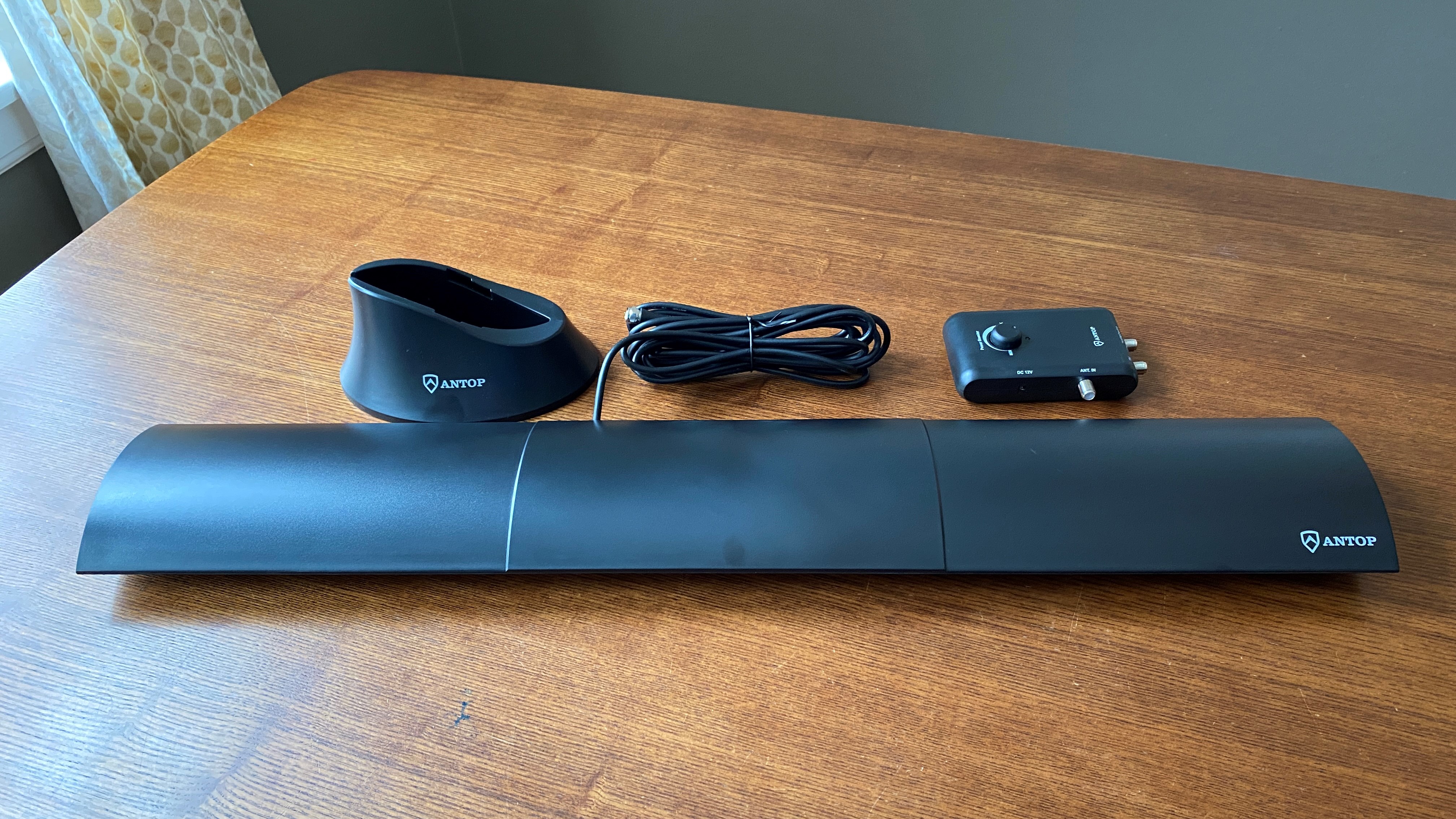
If you live far from a broadcast source and/or you've had trouble with other antennas, the Antop HD Smart Bar (AT-500SBS) could solve your issues—if you're willing to pay a steep price and tolerate the very large size.
The Antop HD Smart Bar is a hard-plastic antenna that measures 2.5 feet wide and can be mounted on your wall like a soundbar, or you can use the included base stand to prop it up vertically. In any case, it's much more visible than nearly any other indoor antenna on the market, but the trade-off is a much longer promised range of 80 miles. It also has a 4G signal filter, an FM tuner, and the ability to connect to a second TV, plus the reception was excellent in our testing. However, with a $119 price tag, we recommend trying cheaper alternatives first to see if they'll meet your needs.

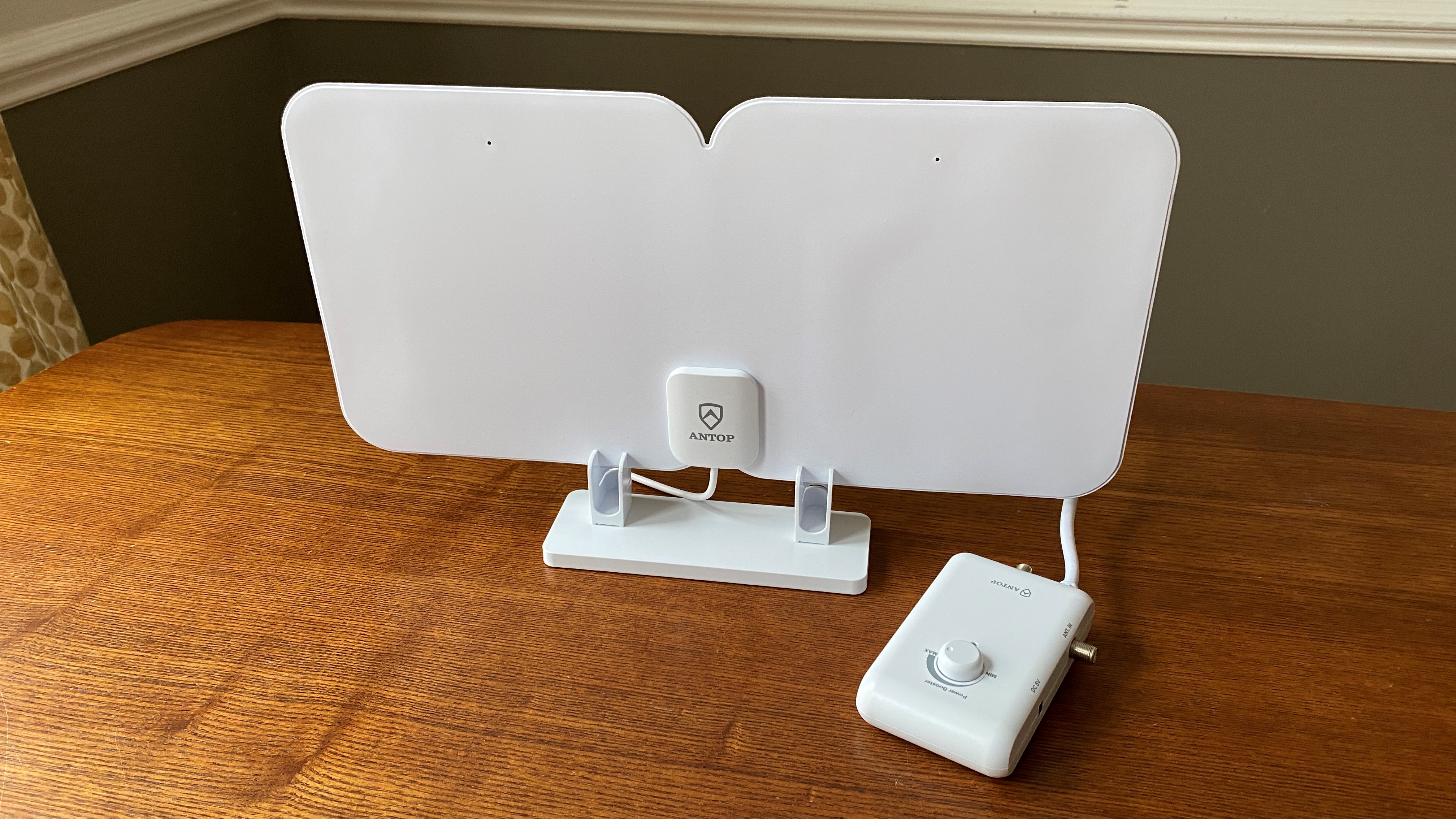
Antop's HD Smart Antenna (SBS-301) keeps most of the perks as the Antop model above, but does so with a slimmer design and slightly lower price. It's a flat plastic design like Amazon's antenna, but actually looks like two of them merged together. You can stick it to a wall with the included Velcro pads or prop it up using the simple plastic stand. In our testing, it pulled fewer channels on the stand next to the TV than when it was mounted higher up on the wall.
This amplified antenna's range is slightly less than the Smart Bar at 70 miles, but it still has the 4G signal filter, FM tuner, and ability to connect to two TVs at once. The $89 price point is easier to stomach too, even if it's higher than all the other non-Antop antennas on this list. The signal looked great to us, but as with the Smart Bar above, this might be an option for those who are having reception issues using other antennas.

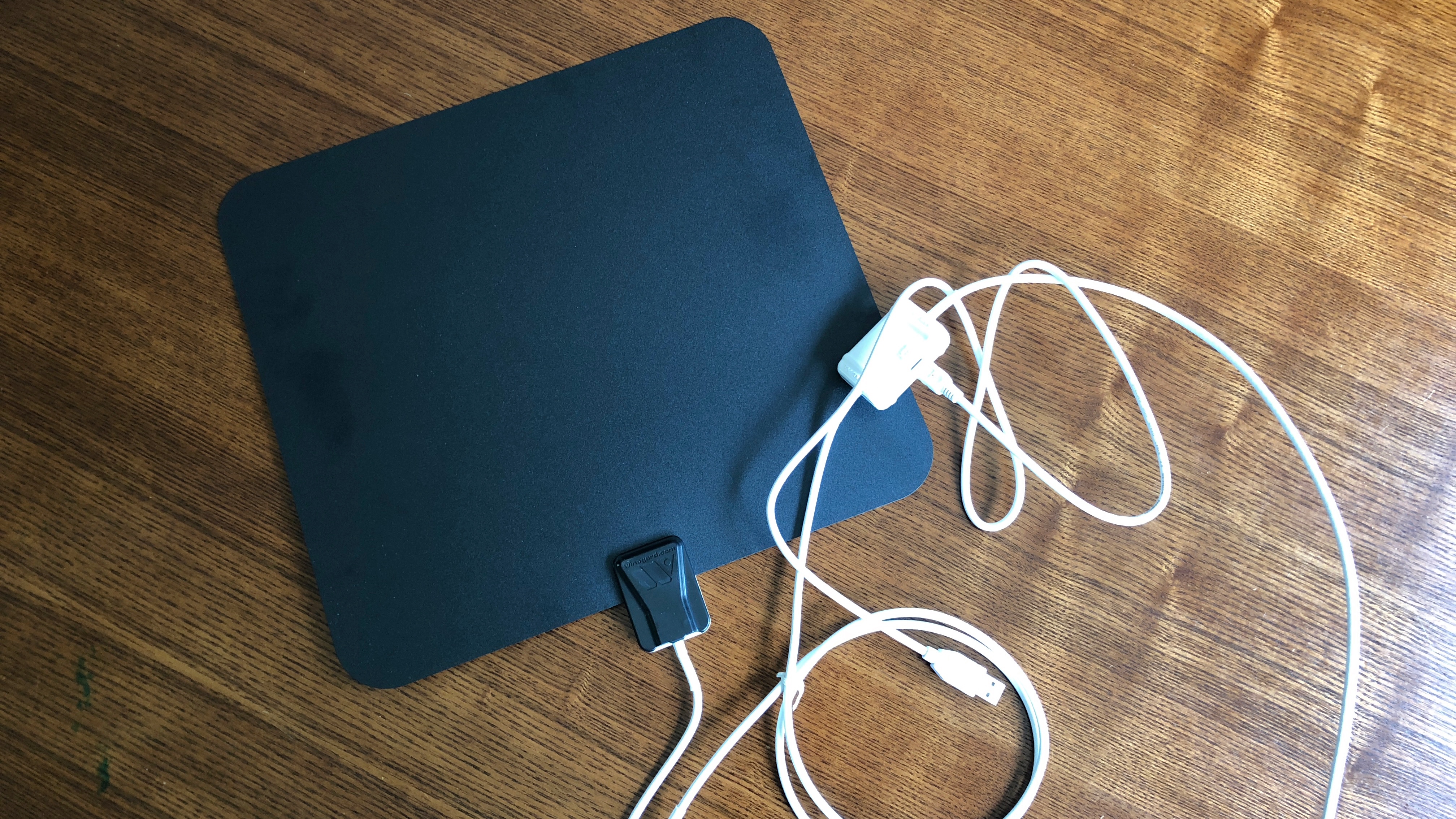
Winegard's amplified FlatWave FL5500A antenna checks all of the same boxes as the AmazonBasics model listed above. It offers a 50-mile range, is flat and nearly paper-thin with black and white sides, and delivers a strong 1080p signal. In our testing, it found just over 50 channels in both locations. We have no complaints about the device itself.
Really, our only issue that the FlatWave FL5500A costs more than double the price of the AmazonBasics 50-mile option, and truth be told, we couldn't tell a difference between them in use. They are nearly identical across the board, but based on current pricing, you'll save more than $25 with Amazon's model. It's great, but there's no clear reason to pay extra that we could see.

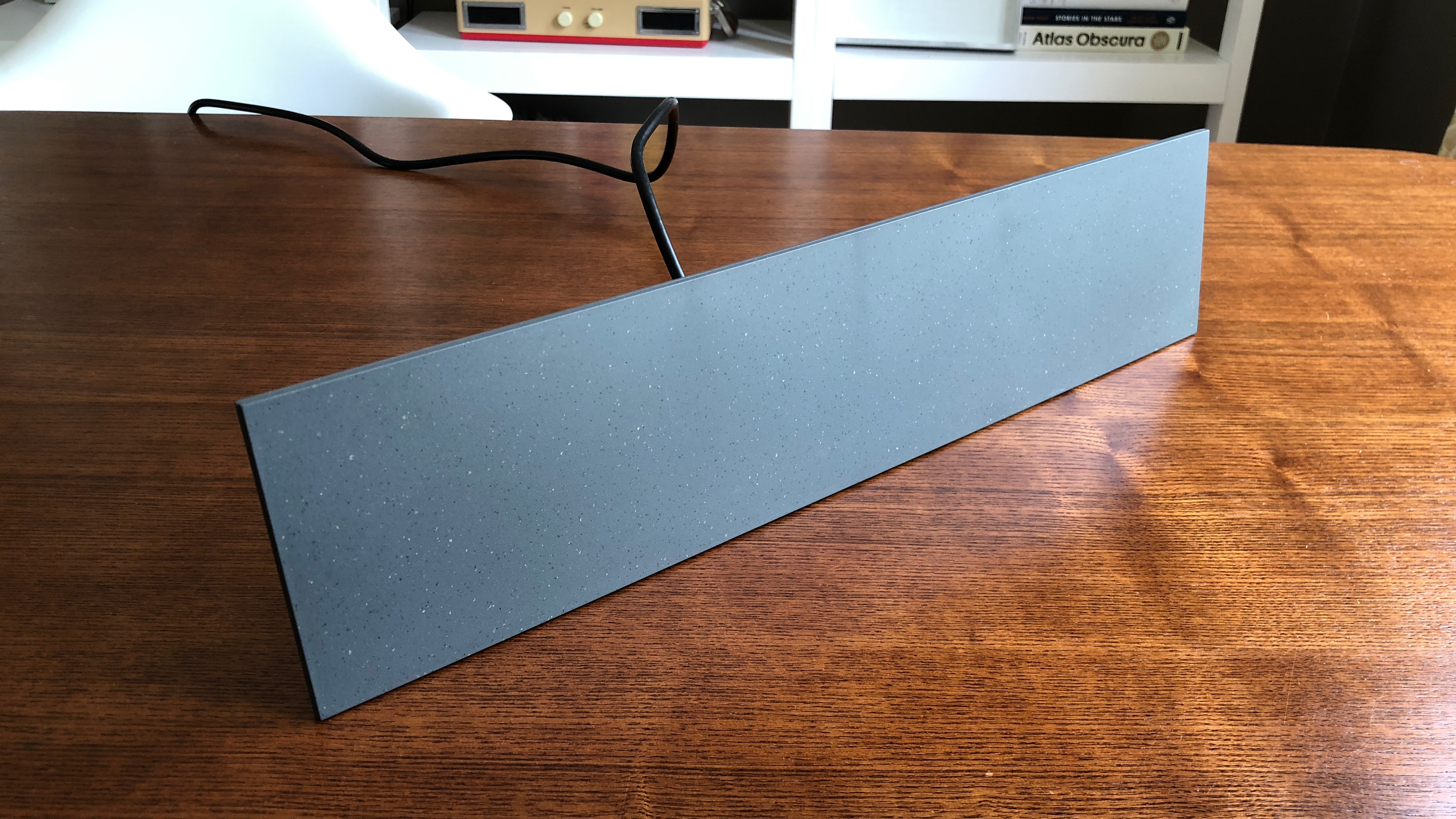
Mohu's new Blade antenna is a one-of-a-kind – instead of a floppy sheet, it's a thicker, rectangular plastic panel that you might not be compelled to hide. You could mount it on the wall below the TV like a soundbar, or there's a little attachable kickstand if you'd rather put it on a TV stand. In any case, it's stylish in a way that most antennas simply don't strive to be. And if you want, you can mount it in an attic or even outside.
But that style comes with frustrations. We struggled mightily to attach a coaxial cable or 90-degree coaxial adapter to the back of the antenna, because its coaxial connector is wedged so tight to the backing. Ultimately, we used a screwdriver to remove the spongey support ring on the back to give our hands a bit more room, and then had to use pliers to tighten the adapter because it wouldn't budge using our fingers. It was a real pain.
Once it was finally up and running, we searched multiple times and found fewer channels with the ground-floor TV – just 44 max, compared to 50+ with the others. None of the omissions were crucial, but it was still a difference. Upstairs, we had to play around with the location before hitting the same 50+ mark as the other antennas. The Blade is sleek and stylish, but the smaller size brings a couple of frustrations along with it.

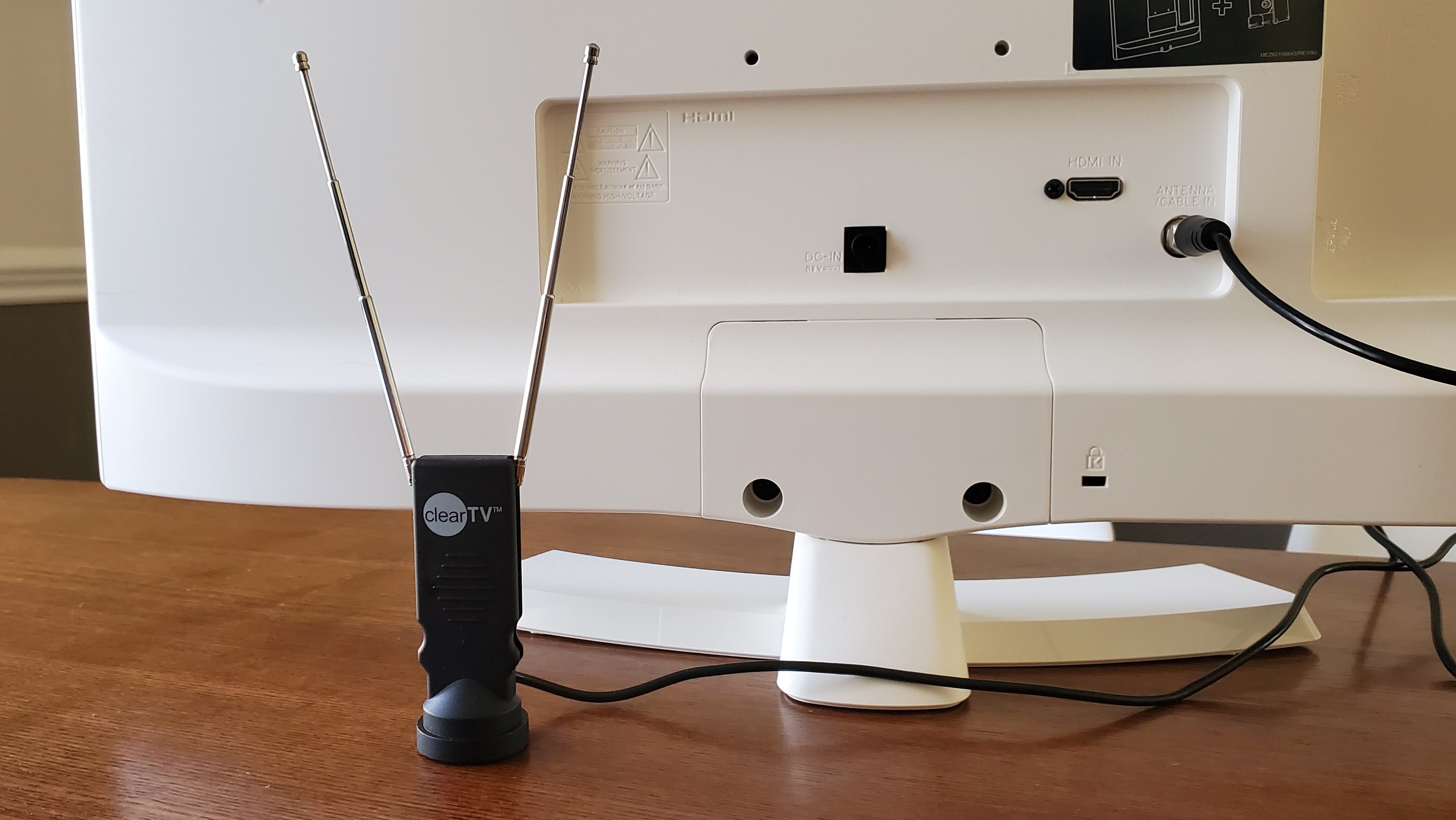
The Clear TV HDTV Antenna reimagines the classic design as a USB stick-sized antenna with extendable rabbit ears. It's small, it's simple, and it's incredibly cheap (we picked ours up from Walmart for a mere $10). But if you're thinking that a design like this is too good to be true, then you're on to something: While we experienced good reception in one location that we've used to test many antennas, we struggled to pull as many channels or as consistent of reception in another area that has been fine with larger, more powerful rivals.
We saw very different results on two floors of a house about 15 miles north of downtown Chicago. On the top floor, the antenna performed similarly to many others that we have tested in the location, picking up 55 channels and providing strong reception on most of them. We tested the antenna both directly behind the TV and a couple feet away from it on the same surface, and the results were similar in both instances.
Downstairs in the living room, the Clear TV was much less successful. We ran multiple channel scans with the antenna behind the TV, both resting on the stand and on the back of the set itself, and only pulled in about 20 channels. Those channels looked clear and were stable, but it was a fraction of what we had pulled one floor higher.
If you have experienced troubles with interference or live farther away from a source, then you'll probably want to invest in something more powerful.
Read the full Clear TV HDTV Antenna review
Indoor TV antenna FAQ
Do I need an antenna with a smart TV?
That depends! TV antennas receive content rather differently than the Wi-Fi or Ethernet enabled streaming apps on most smart TVs these days. An antenna picks up broadcast signals from local channels, such as local news – or national programming from local broadcasting stations.
Anything you get over your TV antenna in the US is free, too, so if you don't want to cough up for a Netflix subscription – or if your internet connection isn't super reliable – it may be a good shout. Keep in mind though that many smart TVs also offer free TV, as with Roku TV Channels or Samsung TV Plus.
Do I need an HD or 4K antenna?
There's technically no such thing as an HD or 4K antenna – so you don't necessarily need an upgraded model to make the most of improved broadcast quality over the past few years.
Best indoor TV antennas: how we tested
For this piece, we tested indoor antennas that remain near your TV, both standard antennas that connect solely via coaxial cable, and amplified ones that add a USB connection or must be plugged into a wall outlet for a powered-up range boost.
We tested several current indoor TV antennas from the top makers in the business, watching to see how many channels each antenna could find, how easy it was to set up, how crisp the signal looked, the style and size of the device, and the price and overall value.
Our testing environment was a two-story house just outside of Chicago, less than 15 miles from downtown. Each antenna was tested on two televisions: one on the first floor, and another upstairs on the second floor.
Even if modern antennas are more reliable than the old versions, they can still be fickle: your distance from broadcast towers is important, but so too is where you place the antenna, where you are in your home, and what's around it. Your experience may vary to ours, as a result, and you may need to experiment with location to yield the most channels to watch.
These are the best indoor TV antennas that we've tested so far, and we'll be adding more to the list once we try more models.
- Best universal remotes: from entry-level clickers to pro zappers
No comments:
Post a Comment